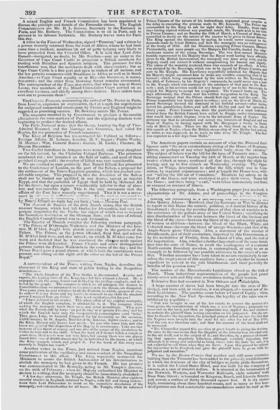A correspondent of the Tintes, writing from Naples, describes the
character of the King and state of public feeling in the Neapolitan dominions- " The whole kingdom of the Two Sicilies is discontented. Avarice and caprice, the leading vices of the King, have left him without a friend. Ile is unpopular with the army, feared and di -liked by the civilian employtis, and de- tested by time people. The romance in which we all indulged, the dreams in Constitutionalism we encouraged on Lis accession to the throne, are dissipated. Two years since lie sent circulars to all the Prefects, in which, apropos de rice, he stud—' It is my desire and my resets e to transmit to my chill the absolute power 1 received from my faller.' Here is a Constitutionalist for you ! " I have referred to his avarice. This white affair of the sulphur monopoly, of which the English complain, is attrilaWdde to it. The company when seeking the monopoly knew their men and acted accordingly. They gave what the French call by turns un tad (le via,' or a picotin cravoine, and for which the English have only the comparatively commonplace word bribe.' They gave, 1 say, to General Filangicri Ihr his friendship on the occasion, 15,000 ducats; to St. Angelo, Minister of the interior, 50,000 ducats; and to the King, !leaven only knows how much. To you who know him, and who kuow me, proof of this disposition of his Majesty IS IIIIIMICSStay. Take another instance of his thirst of money, and one also of the Nature of the absolutism he wishes to transmit to hi, child. When the bank of Falconet failed, a couple or years since, their asets were not very large, but among them was one plump round little sum of 40,001) ducats due by au individual to the house ; at which the King snapped, seized, and gorged it. For the truth of this every Mali recently in Naples can vouch."
Another writer in the Times, just arrived from Naplei, mentions some particulars of the vacillating and mean conduct of the Neapolitan Governmeet in this atlhir. The King repeatedly instructed his Ministers to assure the British Ambassador of his determination to abolish the monopoly he had given to the French. His last promise was communicated to Mr. Kennedy, acting in Mr. Temple's absence, on the 20th of February ; when his Majesty authorized his Minister to declare in writing, that the monopoly should be immediately abolished-
" A few days afterwards, Mr. Temple, the British Minister, after eighteen months' absence, in England, returned to Naples, with full and strong instruc- tions from Lord Palmerston to insist on the immediate dissolution of the monopoly, and indemnification fur all losses. Mr. Temple, while he informed
Prince Cassaro of the nature of his instructions, expressed great surprise at the delay in executing the promise made to Mr. Kennedy. The Prince was commanded by the King to ask for eight days' deliiy. Finally, these eight days having expired without any practical result, Mr. Temple sent in his note to Prince Cassaro; and on Sunday the 16th of March, a Council of State was assembled to decide on the nature of the answer to be given to Great Britain. The King opened the discussion by saying, he would never consent to the demands made by Great Britain, and that the monopoly was no infringement of the treaty of 1816. All the Ministers, excepting Prince Cassaro, Marquis Pietrocatella, and some people say the Marquis Del Caretto, lauded the nag. nanimous resolve of the young Sovereign. The two first.named Ministers humbly represented to lila Majesty that the Royal word having been officially given to the British Government, the monopoly was done away with, and Us Majesty could not retract it without compromising his honour and dignity. The voices of the majority rendered these wise counsels of no effect. A letter was dictated by time Sovereign, which was to be signed by Prince Cassaro, and sent to Mr. Temple. his Excellency respectfully informed his Majesty that his Majesty might command him to make any sacrifice, excepting that of his honour ; which being compromised ky the note written to Mr. Kennedy on the 26th of February, by his Majesty a commands, he could never sign a note to Mr. Temple which was contrary to the substance of that sent to Mr. Ken- nedy ; and, as his services could not any longer he of use to his Sovereign, he prayed his Majesty to accept his resignation. The Council broke up. Tiro days afterwards, the Prince sent his written resignation to the King. The Sovereign insisted that the Prince should first sign and seal the note. The Prince respectfully but firmly dared to refuse ; and on the 21st of March, the proud Sovereign decreed time dismissal of his faithful servant—after lamming served his grandfather, father, and self, with fidelity and zeal for upwards of thirty years. Pumice Cassaro has, since the publication of a most ludiscreer circular from the British Consul, been exiled to Foggia, under circumstances that would have added disgrace even to the infamous Joan of Naples. The pretence was that lie advocated and served the interests of England and not those of Naples, in having signed with Mr. Macgregor a treaty in favour only of British trade. These are the facts as they stood up to the 5th of this mouth at Naples, where the British steam-ship of war Hydra had arrived, in order, as was supposed, to lie ready to take away Mr. Temple. The fleet was expected its a few days from Malta."


























 Previous page
Previous page